

Karl Wienand (born 15 December 1926 in Lindenpütz; died 10 October 2011 in Trier [1] ) was a German politician of the Social Democratic Party (SPD) and secret agent for the DDR's Ministry of State Security (MfS).


Karl Wienand (born 15 December 1926 in Lindenpütz; died 10 October 2011 in Trier [1] ) was a German politician of the Social Democratic Party (SPD) and secret agent for the DDR's Ministry of State Security (MfS).
Karl Wienand's father, a German communist party member, was frequently detained as an enemy of the Nazi regime [2] and often demonstrated against Robert Ley. The Nazis would later kill the man. [3]
After distinguishing himself attending Volksschule, Wienand fils was sent in 1941 to the normal schools in Bad Godesberg and Xanten. He performed military service in the Second World War in a penal battalion [3] and was severely wounded. He suffered a head injury and a dislocated shoulder ; he also needed a leg amputated. He thus qualified as a "70% casualty".
He was widowed twice, and (step)father to five children. One son of his first wife died in an accident. [3] In 1975, he became director of the Bonner "Gesellschaft für kosmetische plastische Chirurgie und Ästhetik mbH Klinik International". [4]
Wienand applied to enter the Nazi party on 9 October 1943, and would be enrolled on 20 April 1944 (as member #10.014.358). [5] [6] In 1947, Wienand attached himself to the SPD. In 1950, he was selected as SPD block captain (German : Unterbezirk ) for the Rhein-Sieg-Kreis. Already by 1951 he had advanced to the Mittelrhein committee (German: Bezirk) and by 1955 the central party council (German: Parteirat ). In 1990, he resigned from politics. In 2002, he left the SPD, anticipating a censure motion (German: Parteiausschluss ).
Per Herbert Wehner, Wienand is a "Mann für heikle Fälle [man with a deft touch]". In the view of the historian Arnulf Baring, he belongs "zum sozialliberalen Kernbereich, zur Handvoll ihrer wichtigsten Figuren [to the central core of social liberalism, the most important handful of figures]". [7]
Following the 1953 German legislative election, Karl Wienand at the age of 26 became the youngest representative in the second German Bundestag. From 15 November 1963 to 13 April 1967 he was deputy chairman of the Bundestag's committee on defense. From 3 March 1964 to 27 April 1967 he headed the SPD's parliamentary working group on national security. From 7 March 1967 to 30 August 1974, Wienand was Chief Whip. His time in the Bundestag lapsed beginning 3 December 1974.
Wienand was ensnared in a series of political scandals, and has been convicted multiple times.
In the Paninternational Flight 112 disaster on 6 September 1971, 22 people died on during an emergency landing on the autobahn outside Hamburg. Wienand, in return for roughly 162,500 Deutsche Marken, had allegedly shielded the airline from the inspection of the Federal Aviation Office. A parliamentary inquiry on the issue but could not reach any firm conclusions due to partisanship. [8]
In a vote of no confidence against Chancellor Willy Brandt in 1972, Wienand supposedly paid the CDU representative Julius Steiner 50,000 DM to abstain, the "Steiner-Wienand affair". As much was admitted in a 1973 press conference following Steiner's second resignation from the Bundestag. Later it was revealed that Steiner had obtained 50,000 DM from the MfS; whether he had been paid twice is unclear.
In 1973, Wienand was stripped of his immunity as a Bundestag member following tax evasion. In 1975 he is believed to have owed altogether 102,000 DM in taxes – not to mention taxes on the moneys from Paninternational.
In 1993, federal prosecutors at the Federal Prosecutor's Office encountered a description of a covert agent in Main Directorate for Reconnaissance (HVA) records that placed them on Wienand's trail. Starting in June 1959, the MfS had managed Wienand as an possible unofficial collaborator (German: Inoffizieller Mitarbeiter (IM) Vorlauf) code-named "Streit". In 1971, he was accepted as a penetrative unofficial collaborator (German: IM mit besonderen Aufgaben) and renamed in the records as "Kontaktperson". In 1988, he was reregistered as an intelligence source. [9] The prosecutors alleged proof that from 1970 to 1989 he had secretly worked with the MfS' HVA. The Düsseldorf regional court (German: Oberlandesgericht Düsseldorf ) deemed his punishable work to begin in 1976, as he previously had a protection for official speech; and sentenced him in 1996 on account of his espionage for the DDR to 2.5 years' time and financial penalties equivalent to the amount of funds Wienand had received from the MfS: 1 million DM. According to the memoirs of the HVA head Markus Wolf, Wienand had been in contact with DDR foreign agents since the end of the 1960s. The Federal Court of Justice (BGH) rejected Wienand's cassatory appeal on 28 November 1997, [10] which was the final court of appeals for the Düsseldorfer jurisdiction. Thereafter German president Roman Herzog commuted his sentence to 5 years' probation on account of Wienand's heart disease. [11]
Wienand denied the accusations unto his death.
Wienand took millions in bribes for planning and construction of the Cologne waste incinerator (MVA). Allegedly, he was an accomplice to corruption, bribery, and tax evasion. In 2002, he spent three months in pre-trial detention (German : Untersuchungshaft ), before the Cologne regional court (German: Oberlandesgericht Köln), on account of deteriorating health, let him instead provide sureties against flight (surrendering his passport and personal ID, as well as performing thrice-weekly check-ins at the local police station). These conditions were then lifted in August 2003 by the Cologne district court (German: Landgericht Köln ). Because of his health, the investigation into Wienand could not remain open for long. On 14 December 2004, the district court sentenced Karl Wienand to two years' probation. The court considered it proven, that the 77‑y.o. had been guilty of aiding and abetting a corrupt breach of faith. Wienand's lawyer had admitted at the start of the trial, that he had received the amount of a million euros in connection with the Cologne MVA, but not the quantity of 2.1 million that the state's lawyer claimed. The BGH lifted a portion of the sentence in 2005, Wienand had already been acquitted of parts of it in the cologne district court. [12]
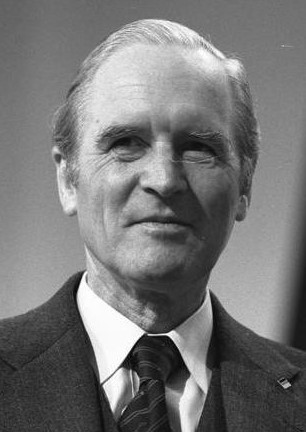
Karl Carstens was a German politician. He served as the president of West Germany from 1979 to 1984.

The Deutsche Reichspartei (DRP), also known as the German Empire Party or German Imperial Party, was a nationalist, far-right, and later neo-Nazi political party in West Germany. It was founded in 1950 from the German Right Party, which had been set up in Lower Saxony in 1946 and had five members in the first Bundestag, and from which it took the name. Its biggest success and only major breakthrough came in the 1959 Rhineland-Palatinate regional election, when it sent a deputy to the assembly.
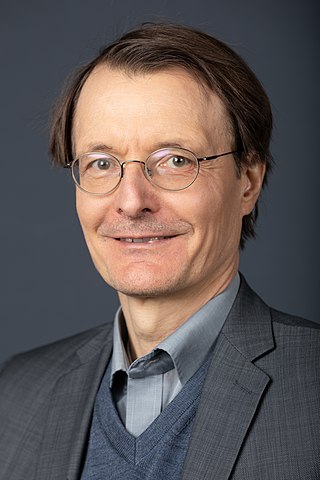
Karl Wilhelm Lauterbach is a German scientist, physician, and politician of the Social Democratic Party of Germany (SPD), who has served as Federal Minister of Health since 8 December 2021. He is professor of health economics and epidemiology at the University of Cologne. Since the 2005 German federal election, he has been a member of the Bundestag.

Adolf Arndt was a German politician of the Social Democratic Party (SPD) and former member of the German Bundestag.

Annemarie Renger was a German politician for the Social Democratic Party of Germany (SPD).

Speed limits in Germany are set by the federal government. All limits are multiples of 10 km/h. There are two default speed limits: 50 km/h (31 mph) inside built-up areas and 100 km/h (62 mph) outside built-up areas. While parts of the autobahns and many other freeway-style highways have posted limits up to 130 km/h (81 mph) based on accident experience, congestion and other factors, many rural sections have no general speed limit for some classes of vehicles. The Road Traffic Regulations (StVO) section on speed begins with the requirement which may be rendered in English:
Any person driving a vehicle may only drive so fast that the car is under control. Speeds must be adapted to the road, traffic, visibility and weather conditions as well as the personal skills and characteristics of the vehicle and load.

Helmut Müller-Enbergs is a German political scientist who has written extensively on the Stasi and related aspects of the German Democratic Republic's history.

Thomas Ammer was a German historian who as a young man studied to become a physician. He was arrested and imprisoned in 1958 for anti-government political activism in East Germany and he never qualified as a medical doctor. His 15-year prison sentence was cut short in August 1964 when his release was purchased by the West German government, and at the age of 27 he relocated to the German Federal Republic.
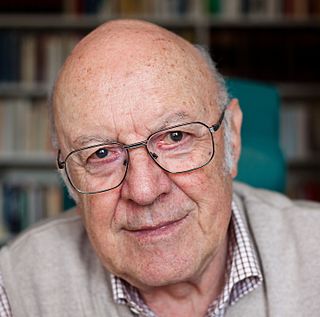
Karl Wilhelm Fricke is a German political journalist and author. He has produced several of the standard works on resistance and state repression in the German Democratic Republic (1949–1990). In 1955, he became one of several hundred kidnap victims of the East German Ministry for State Security, captured in West Berlin and taken to the east where for nearly five years he was held in state detention.
William Borm was a German politician, of the Free Democratic Party (FDP). He was a member of the Bundestag from 1965 to 1972, and a member of the FDP National Executive Committee from 1960 to 1982. Several years after his death, it was revealed that since the late 1950s he had been an agent of the Stasi, the State Security Service of the German Democratic Republic.
Lilli Pöttrich is a German lawyer. Under the IM cover-name "Angelika" she served as an agent of the "Hauptverwaltung Aufklärung" / HVA, the foreign intelligence branch of the East German Ministry for State Security (Stasi).

Christa Luft is a German economist and politician of the SED/PDS. Luft joined the SED in 1958. From 18 November 1989 to 18 March 1990, she was the Minister of Economics in the Modrow government. From 1994 to 2002 she was member of the Bundestag for the PDS.

Leni Breymaier is a German politician of the Social Democratic Party of Germany (SPD).
Heidi Knake-Werner is a German politician. She served as a member of the German parliament ("Bundestag") between 1994 and 2002. Between 2002 and 2009 she was one of Berlin's more high-profile senators.

Katrin Helling-Plahr is a German lawyer and politician of the Free Democratic Party (FDP) who has been a member of the Bundestag since the 2017 election.
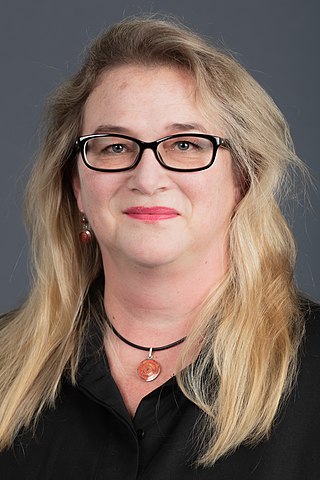
Katrin Budde is a German politician of the Social Democratic Party (SPD), who has been serving as a member of the Bundestag from the state of Saxony-Anhalt since 2017.
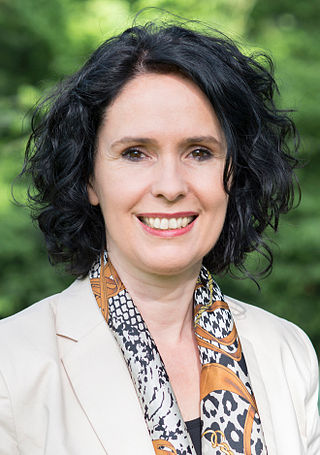
Elisabeth Winkelmeier-Becker is a German lawyer and politician of the Christian Democratic Union (CDU) who has been serving as a member of the Bundestag from Rhein-Sieg-Kreis I in the state of North Rhine-Westphalia since 2005.
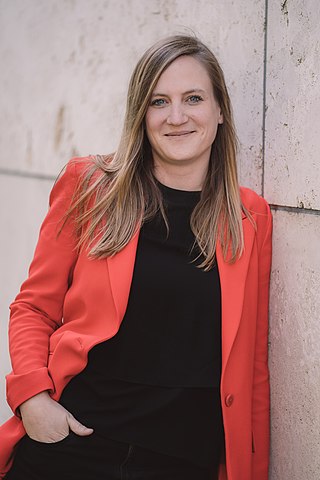
Carmen Wegge is a German politician of the Social Democratic Party (SPD) who has been serving as a member of the Bundestag since 2021.

Esra-Leon Limbacher is a German politician of the Social Democratic Party (SPD) who has been serving as a member of the Bundestag since 2021. He has been the SME representative and deputy economic policy spokesperson of the SPD parliamentary group since 2022. Previously, he was a member of the Saarland state parliament Landtag of Saarland until November 2021.

Wolfgang Lüder was a German lawyer and politician. He was a member of the Free Democratic Party.